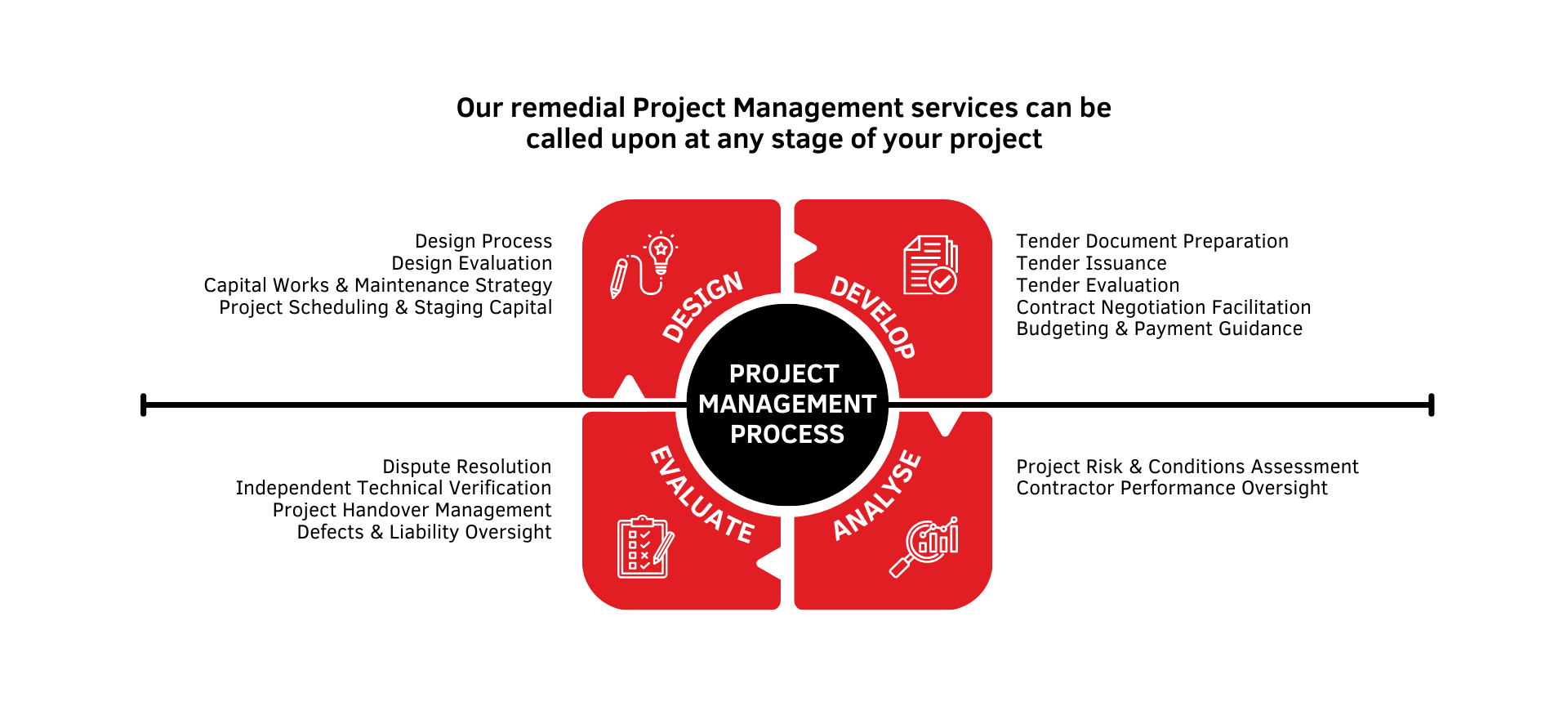BCRC provides client-side project management services, also known as Superintendent services in most Australian Standard contracts, across Building and Strata, Commercial buildings and Infrastructure. Once the requirements for repair have been determined and the repair is designed, Owners or Strata Managers will need to arrange for the remediation of the asset.
We specialise in overseeing class 2, 3, 5, 7, 8 and 9 building projects, expertly managing external Design Practitioners, Engineers, and Consultants in a multidisciplinary approach. As registered Principal Design Practitioners, we meticulously review and coordinate multiple designs to achieve optimal synergy and alignment before design work begins.
We’re equally adept at taking over projects where initial design processes have faltered, applying our expertise to realign and manage the process effectively. We will get your project back on track, within budget and successfully delivered, from inception to completion.

BCRC approach to the Project Lifecycle
Initiation
A project’s tender documents are the legal means by which a client indicates their requirements to those parties who are bidding to carry out the work. Given the uniqueness of remedial projects, with their particular limitations such as live-in occupants and serviceable structures, the tender documents need to accurately encapsulate the work required and set out the correct method for carrying out that work.
To secure the best value remediation for our clients, we prepare detailed Request for Tender (RFT) documents to act as the blueprint for a successfully delivered outcome. These documents will include a carefully crafted Scope of Works and a detailed repair specification that includes technical drawings. High-quality documents like these can reduce overall project costs and ensure on-time project completion, while delivering an optimal and durable repair solution. As part of this process, BCRC conduct in-depth investigations into the cause of the deterioration before recommending a repair solution and preparing a detailed repair specification.
Equally important, we understand that contract variations can arise in the course of remedial work due to access limitations, visibility issues and feasibility constraints which may restrict initial comprehensive investigations. That’s why we adopt a thorough, proactive approach from the start. By carefully managing potential variations, we ensure that contractor bids are assessed against both the initial scope of work and potential variations. This allows us to account for any commercial impacts in our tender evaluations, providing you with clear, informed insights and a smoother project experience.
Planning
We will distribute the Tender documents to the industry at large through dedicated tender notification services, or provided directly to a select panel of known, trusted remedial contractors. We review this panel annually for performance and accreditations, and they share our passion for delivering high quality outcomes.
We evaluate tenders received and recommend an offer that ensures our client obtains an optimal price and receives an appropriate quality of workmanship. If none of the submitted tenders are acceptable, BCRC will recommend that none are accepted, and the market should be further tested.
The importance of preparing detailed tender documents underpins our approach. By ensuring that all construction processes are thoroughly itemised, each with a dedicated timeframe and cost, we can effectively compare tenders. It is also by this process that an overall project cost and duration can be considered.
Execution
BCRC will facilitate the award of contracts to successful tenderers. We have inhouse expertise to assist in contract development, and a depth of industry experience to represent our client’s needs when negotiating contract terms with the selected contractor.
During the remedial works, we can act as project Superintendent and provide ongoing advice to our client relating to quality, variations, progress reports and progress claims, as well as certification.
Closure
We provide representation during work contracts by appointing a client project coordinator and regularly conducting a quality inspection. Together, they ensure that the scoped remedial works are executed in accordance with the specification and quality standards. Our experience in managing contract risk ensures that our clients obtain reliable outcomes in terms of expenditure and the quality of the remedial works.
As part of our handover to the client, we will work with the remedial builder and other consultants to supply an Operations and Maintenance Manual listing vital information for the asset owner:
- Materials and supplier warranty documentation
- Trade certificates
- As-built drawings
- Notices of compliances
- Cleaning and maintenance requirements
- Future maintenance regimes.




